Nursecate
On this page, you find all documents, package deals, and flashcards offered by seller NURSECATE.
- 537
- 0
- 0
Community
- Followers
- Following
537 items
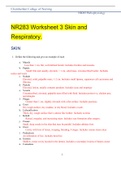
NR283 Worksheet 3 Skin and Respiratory.
1. Define the following:and give an example of each a. Macule Less than 1 cm, flat, well defined border. Includes freckles and measles. b. Papule Small firm and usually elevated, < 1 cm, solid mass, circumscribed border. Includes moles and warts c. Nodule Elevated, solid, palpable mass, 1-2 cm. Includes small lipoma, squamous cell carcinoma and fibroma. d. Pustule Elevated, lesion, usually contains purulent. Includes acne and impetigo e. Vesicle ...
- Exam (elaborations)
- • 6 pages •
1. Define the following:and give an example of each a. Macule Less than 1 cm, flat, well defined border. Includes freckles and measles. b. Papule Small firm and usually elevated, < 1 cm, solid mass, circumscribed border. Includes moles and warts c. Nodule Elevated, solid, palpable mass, 1-2 cm. Includes small lipoma, squamous cell carcinoma and fibroma. d. Pustule Elevated, lesion, usually contains purulent. Includes acne and impetigo e. Vesicle ...
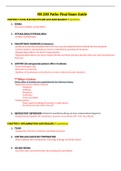
NR 283 Patho Final Exam Guide
1. EDEMA Increased capillary permeability 2. HYPOKALEMIA/HYPERKALEMIA -Cardiac dysrhythmias 3. PARATHYROID HORMONE (4 Scenarios) -produced in parathyroid gland which are four pea-sized glands that lie behind the thyroid gland -Calcium balance and phosphorus level is controlled by parathyroid hormone -Hypoparathyroidism can lead to hypocalcemia -Hyperparathyroidism can lead to hypercalcemia and bone demineralization that may cause spontaneous fractures. 4. ACIDOSIS (He said gener...
- Exam (elaborations)
- • 12 pages •
1. EDEMA Increased capillary permeability 2. HYPOKALEMIA/HYPERKALEMIA -Cardiac dysrhythmias 3. PARATHYROID HORMONE (4 Scenarios) -produced in parathyroid gland which are four pea-sized glands that lie behind the thyroid gland -Calcium balance and phosphorus level is controlled by parathyroid hormone -Hypoparathyroidism can lead to hypocalcemia -Hyperparathyroidism can lead to hypercalcemia and bone demineralization that may cause spontaneous fractures. 4. ACIDOSIS (He said gener...
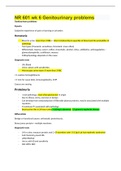
NR 601 wk 6 Genitourinary problems
Genitourinary problems Dysuria Subjective experience of pain or burning on urination Hematuria - Blood in urine; more than 3 RBC=> direct relationship to quantity of blood and the probability of pathology - Two types (Transient: sometimes, Persistent: more often) - Differentials: trauma, cancer, coffee, chocoholic, alcohol, citrus, antibiotics, anticoagulation, - glomerulonephritis, urolithiasis, menses - Pathophysiology-depends on the cause Diagnostic tests - UA: Blood - Urine cult...
- Exam (elaborations)
- • 12 pages •
Genitourinary problems Dysuria Subjective experience of pain or burning on urination Hematuria - Blood in urine; more than 3 RBC=> direct relationship to quantity of blood and the probability of pathology - Two types (Transient: sometimes, Persistent: more often) - Differentials: trauma, cancer, coffee, chocoholic, alcohol, citrus, antibiotics, anticoagulation, - glomerulonephritis, urolithiasis, menses - Pathophysiology-depends on the cause Diagnostic tests - UA: Blood - Urine cult...
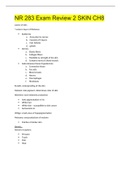
NR 283 Exam Review 2 SKIN CH8
Layers of skin: *varies in layer of thickness • Epidermis a. Avascular/no nerves b. Consists of 5 layers c. Hair follicles d. glands • Dermis a. Elastic fibers b. Collagen fibers c. Flexibility & strength of the skin d. Contains nerves & blood vessels • Subcutaneous tissue (hypodermis) a. Connective tissue b. Fat cells c. Blood vessels d. Nerves e. Macrophages f. fibroblasts Keratin: waterproofing of the skin Melanin: skin pigment- determines color of skin Albinisim: l...
- Exam (elaborations)
- • 17 pages •
Layers of skin: *varies in layer of thickness • Epidermis a. Avascular/no nerves b. Consists of 5 layers c. Hair follicles d. glands • Dermis a. Elastic fibers b. Collagen fibers c. Flexibility & strength of the skin d. Contains nerves & blood vessels • Subcutaneous tissue (hypodermis) a. Connective tissue b. Fat cells c. Blood vessels d. Nerves e. Macrophages f. fibroblasts Keratin: waterproofing of the skin Melanin: skin pigment- determines color of skin Albinisim: l...
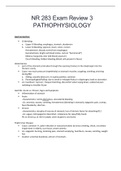
NR 283 Exam Review 3 PATHOPHYSIOLOGY
Gastrointestinal • GI bleeding a. Upper GI bleeding: esophagus, stomach, duodenum b. Lower GI bleeding: jejenum, ileum, colon, rectum Hematemesis: bloody vomit (from esophagus) Hematochezia: bright-red blood (colon, rectum “hemmoroid”) Melena: burgundy color (old blood; jejunum) Occult bleeding: hidden bleeding (blood cells present in feces) Hiatal Hernia: • part of the stomach protrudes through the opening (hiatus) in the diaphragm into the thoracic cavity • Cause: too muc...
- Exam (elaborations)
- • 14 pages •
Gastrointestinal • GI bleeding a. Upper GI bleeding: esophagus, stomach, duodenum b. Lower GI bleeding: jejenum, ileum, colon, rectum Hematemesis: bloody vomit (from esophagus) Hematochezia: bright-red blood (colon, rectum “hemmoroid”) Melena: burgundy color (old blood; jejunum) Occult bleeding: hidden bleeding (blood cells present in feces) Hiatal Hernia: • part of the stomach protrudes through the opening (hiatus) in the diaphragm into the thoracic cavity • Cause: too muc...

ATI COMPREHENSIVE C
1. A nurse is caring for a client who has bipolar disorder and is experiencing acute mania. The nurse obtained a verbal prescription for restraints. Which of the following should the actions the nurse take? A. Request a renewal of the prescription every 8 hr. B. Check the client’s peripheral pulse rate every 30 min C. Obtain a prescription for restraint within 4 hr. D. Document the client’s condition every 15 minutes 2. A nursing planning care for a school-age child who is 4 hr postoper...
- Exam (elaborations)
- • 35 pages •
1. A nurse is caring for a client who has bipolar disorder and is experiencing acute mania. The nurse obtained a verbal prescription for restraints. Which of the following should the actions the nurse take? A. Request a renewal of the prescription every 8 hr. B. Check the client’s peripheral pulse rate every 30 min C. Obtain a prescription for restraint within 4 hr. D. Document the client’s condition every 15 minutes 2. A nursing planning care for a school-age child who is 4 hr postoper...
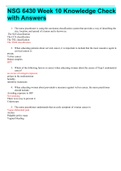
NSG 6430 Week 10 Knowledge Check with Answers
1. The nurse practitioner is using the carcinoma classification system that provides a way of describing the size, location, and spread of a tumor and is known as: The SLS classification The CCS classification The TSL classification The TNM classification 2. When educating patients about cervical cancer, it is important to include that the most causative agent in cervical cancer is: PCOS Vulvar cancer Herpes simplex HPV 3. Which of the following factors is correct when educating w...
- Exam (elaborations)
- • 1 pages •
1. The nurse practitioner is using the carcinoma classification system that provides a way of describing the size, location, and spread of a tumor and is known as: The SLS classification The CCS classification The TSL classification The TNM classification 2. When educating patients about cervical cancer, it is important to include that the most causative agent in cervical cancer is: PCOS Vulvar cancer Herpes simplex HPV 3. Which of the following factors is correct when educating w...
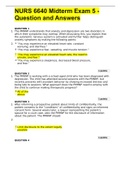
NURS 6640 Midterm Exam 5 - Question and Answers
QUESTION 1 1. The PMHNP understands that anxiety and depression are two disorders in which their symptoms may overlap. When discussing this, you explain that the autonomic nervous system is activated and further helps distinguish anxiety symptoms by making the following points: 2. A. “You may experience an elevated heart rate, constant worrying, and diarrhea.” B. “You may experience fear, sweating, and muscle tension.” C. “You may experience an elevated heart rate, the need to u...
- Exam (elaborations)
- • 29 pages •
QUESTION 1 1. The PMHNP understands that anxiety and depression are two disorders in which their symptoms may overlap. When discussing this, you explain that the autonomic nervous system is activated and further helps distinguish anxiety symptoms by making the following points: 2. A. “You may experience an elevated heart rate, constant worrying, and diarrhea.” B. “You may experience fear, sweating, and muscle tension.” C. “You may experience an elevated heart rate, the need to u...
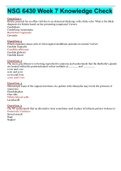
NSG 6430 Week 7 Knowledge Check
Question 1 Kristin presents for an office visit due to an abnormal discharge with a fishy odor. What is the likely diagnosis for Kristin based on her presenting symptoms? Correct Candidiasis Condyloma Accuminata Bacterial Vaginosis Cervicitis Question 2 Which organism causes 90% of vulvovaginal candidiasis episodes in women? correct Candida tropicalis Candida albicans Candida glabrata Candida krusei Question 3 The nurse practitioner is reviewing reproductive anatomy and understa...
- Exam (elaborations)
- • 1 pages •
Question 1 Kristin presents for an office visit due to an abnormal discharge with a fishy odor. What is the likely diagnosis for Kristin based on her presenting symptoms? Correct Candidiasis Condyloma Accuminata Bacterial Vaginosis Cervicitis Question 2 Which organism causes 90% of vulvovaginal candidiasis episodes in women? correct Candida tropicalis Candida albicans Candida glabrata Candida krusei Question 3 The nurse practitioner is reviewing reproductive anatomy and understa...
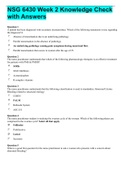
NSG 6430 Week 2 Knowledge Check with Answers Question 1 A patient has been diagnosed with secondary dysmenorrhea. Which of the following statements is true regarding the diagnosis?A Absence of menstruation due to an underlying pathology. Painful me
Question 1 A patient has been diagnosed with secondary dysmenorrhea. Which of the following statements is true regarding the diagnosis?A Absence of menstruation due to an underlying pathology. Painful menstruation in the absence of pathology. An underlying pathology causing pain symptoms during menstrual flow. Painful menstruation that occurs in women after the age of 35. Question 2 The nurse practitioner understands that which of the following pharmacologic therapies is a...
- Exam (elaborations)
- • 2 pages •
Question 1 A patient has been diagnosed with secondary dysmenorrhea. Which of the following statements is true regarding the diagnosis?A Absence of menstruation due to an underlying pathology. Painful menstruation in the absence of pathology. An underlying pathology causing pain symptoms during menstrual flow. Painful menstruation that occurs in women after the age of 35. Question 2 The nurse practitioner understands that which of the following pharmacologic therapies is a...
